KING OF NEW YORK (1990)
A drug kingpin is released from prison and seeks to take total control of the criminal underworld in order to give back to the community.
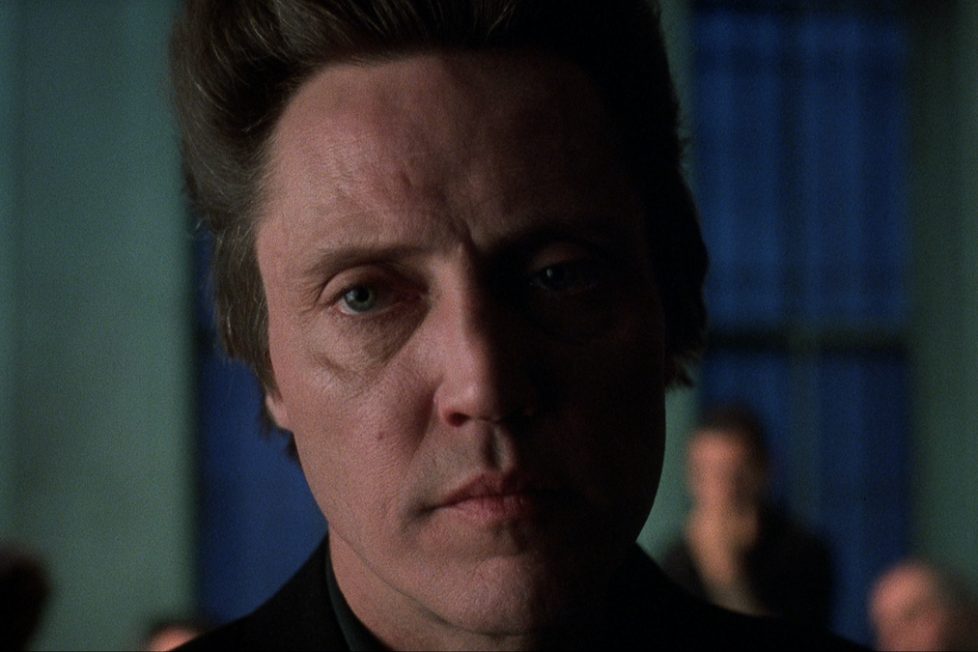
A drug kingpin is released from prison and seeks to take total control of the criminal underworld in order to give back to the community.


The promise and hopes of a new decade couldn’t have lasted long in the early hours of the 1990s, if they even existed at all. Distrust of institutions was only strengthened during the Reagan years, when American exceptionalism was pushed upon the world, while the country’s poor were largely left to fend for themselves. The oppressive war on drugs only seemed to cause further damage to impoverished communities, while a new Bush presidency wasn’t exactly a tonic. The only ones who seemed to flourish in the 1980s were the already wealthy businessmen.
Abel Ferrara’s King of New York is the bridge from one decade into the next; a borderline nihilistic cry of shame and frustration. It’s a film directly informed by 1980’s divisive politics, following feared drug lord Frank White (Christopher Walken) after his released from a long stint in prison, looking to regain control of the city. He also wishes to do some manner of ‘good’, in the form of saving children’s hospitals, and taking out drug cartels who earn their money dirtily—well, more dirtily than him.
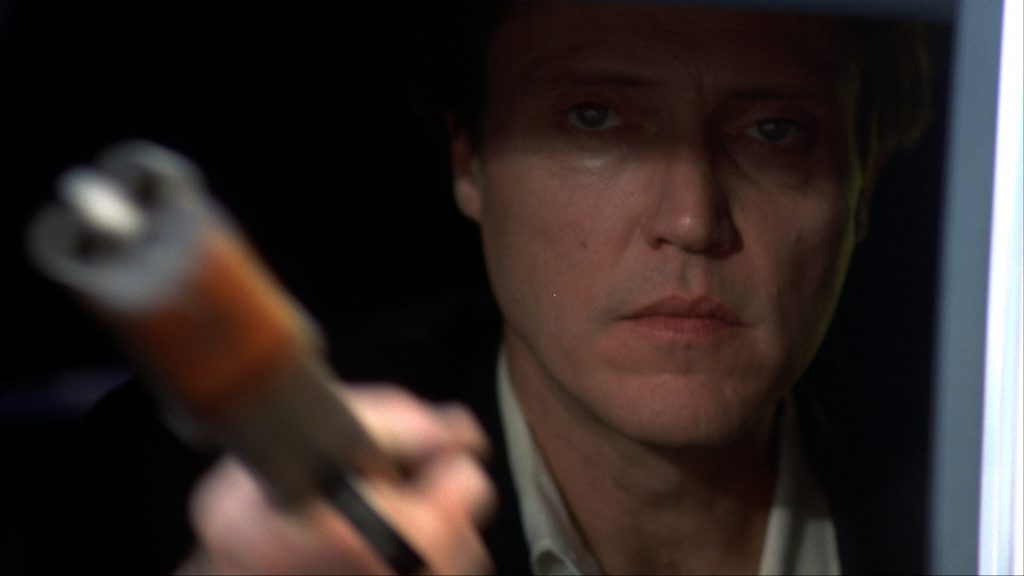
If Goodfellas, released the same year, was the process of a gangster losing his soul to one of the systems that runs America, then King of New York is the process of a gangster trying to reclaim that soul. If Frank White even has a soul is an open question. King of New York is as much about moral and spiritual corruption as it is about literal corruption… although there’s plenty of the latter, too.
Detectives Gilley (David Caruso), Bishop (Victor Argo), and Flanigan (Wesley Snipes) pursue Frank and his crew with reckless aplomb. Bishop is by-the-books, but Gilley and Flanigan are something closer to vigilantes, personally offended by Frank’s swagger and cockiness and dedicated to destroying him—even if it means storming a safe house with shotguns and bags over their heads. Gilley claims he’s just trying to keep the streets safe, but it’s a transparent claim. Embarrassment at his own ineffectualness radiates from him. It’s only a short fall from respected member of society to running around on the streets with firearms.
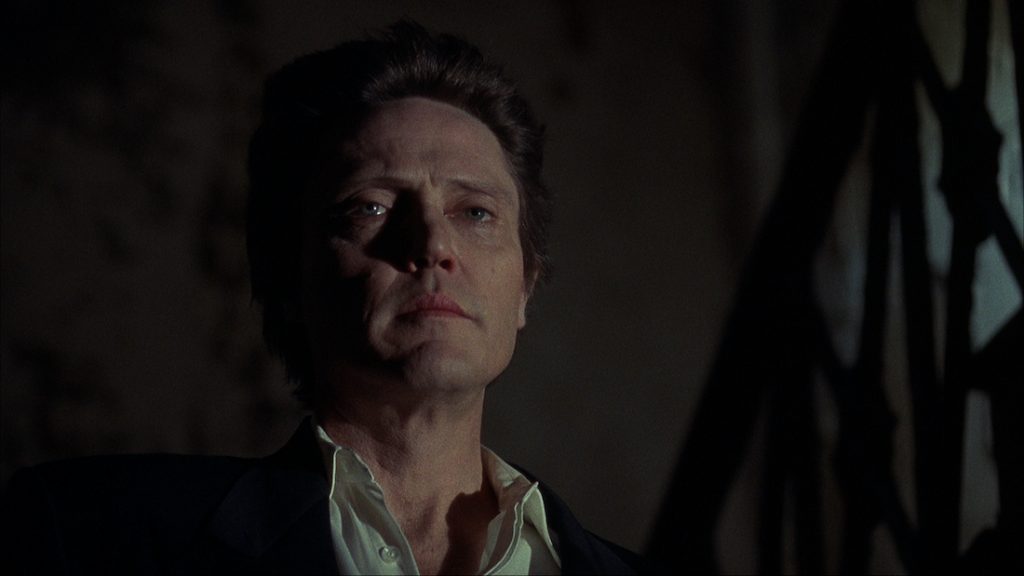
Ferrara draws clever parallels between the different levels of power in New York. Frank isn’t far removed from the frustrations of the police force. Their fury comes from their desire to be taken seriously as upholders of law, while Frank’s fury comes from his frustration that he can’t be taken seriously as a legitimate businessman. When he expresses his desire to become the Mayor of New York, he’s laughed at, while his suggestion that he could save a soon-to-be-foreclosed children’s hospital is scoffed at.
But here Ferrara makes an important distinction; Frank’s supposedly rebuffed by congressmen because of the nefarious ways he makes his money… but in reality, it’s simply doubt he has the money, rather than anything virtuous. Once he shows that he does have the cash, the phrase ‘blood money’ seems to slip conveniently from the minds of the congressmen. It illustrates a dark truth in business: that enough money will abate the worries about where it came from.
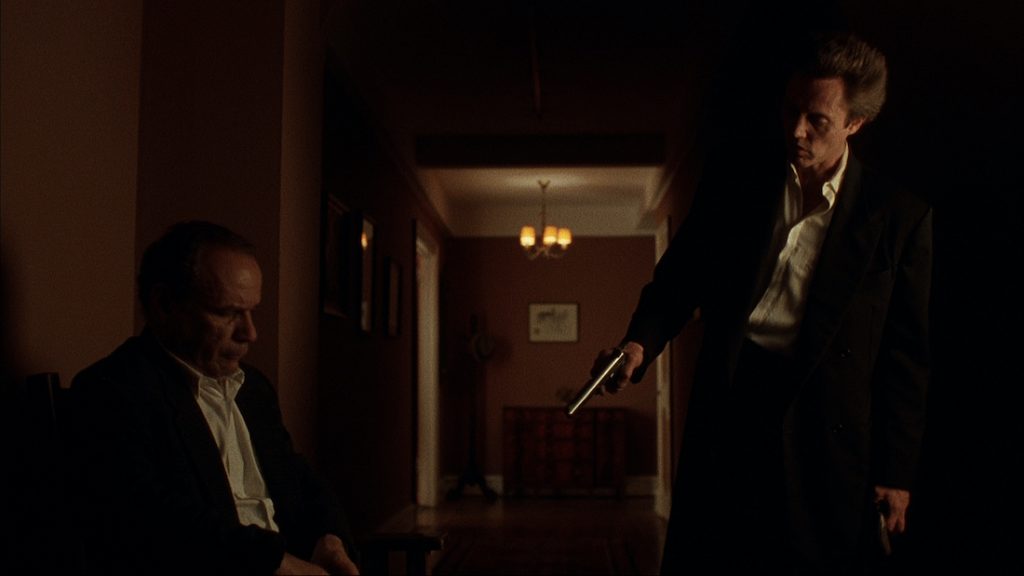
Be it through throwing cash at a situation, or through using excessive firepower, the frustrations of Frank, his crew, the police, and the local government can all be briefly squashed. It’s a damning indictment on Ferrara’s part—an incendiary device designed to reveal just how corrupt systems of power are, and that the ultimate pursuit of capital gain and control destroys any notion of moral superiority. Nobody’s fighting fair.
What elevates Ferrara’s film, and makes it such a complex study of character is that, though it teeters on the brink of hopelessness, it never fully takes the plunge. Underlying Frank’s cold, steely stare is an aching shame. Call it a product of Ferrara’s Catholic upbringing, or perhaps a more immediate anxiety about one’s role in systems of oppression, but King of New York is utterly haunted by regret. Walken has perhaps one of the most distinctive faces in cinema, but his abilities as an actor go far beyond the recognisable traits of his look. When he’s first reunited with his crew, Frank grins, but Walken never loses the look of pain in his eyes. He yelps, dances and plays with them, but when the smile drops, the shadow falls over his face again and we don’t see a frightening, powerful man… we see one who is truly lost.
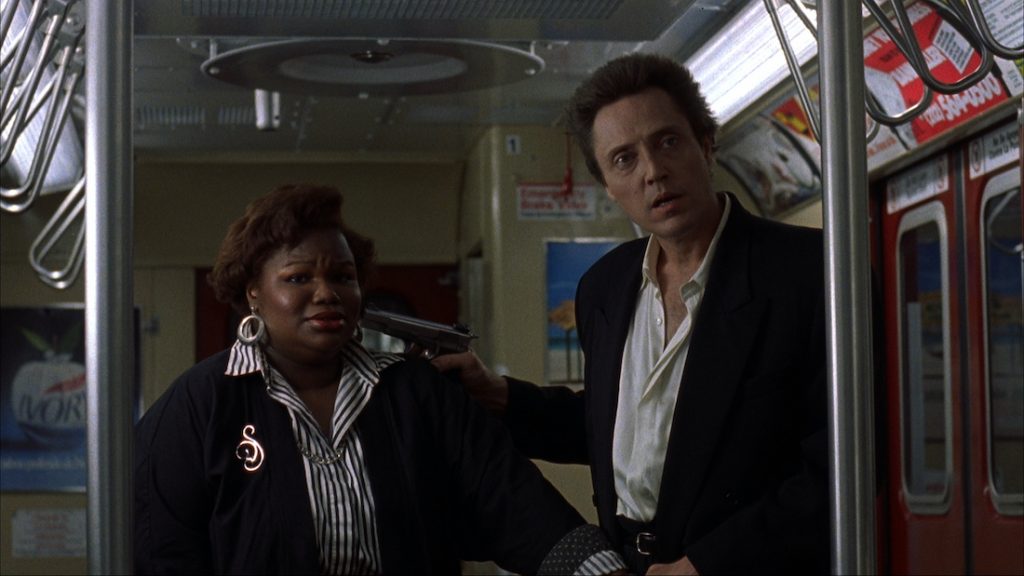
Ferrara’s dialogue is transactional and businesslike, so it’s not dialogue but performance that brings out the notes of tragedy in the story. With his shock of black hair and stilted yet deliberate delivery, Walken seems less like a mob boss from our world and instead more gestural, expressive, and unusual. It’s no coincidence that amongst gorgeously framed images of Frank pining over a distant and dark city, some of the crew go to a screening of Nosferatu (1922). Be it the manner in which Frank drains the city with a needle in place of fangs, or in the self-imposed isolation that he nocturnally watches the world, but Frank is very much a vampire; villainous but tragic, and oddly sympathetic.
Of course, Christopher Walken would go on to play a literal vampire in Ferrara’s incredible horror film The Addiction (1995), and you can sense the seeds being planted here. In that film, his vampire, Peina, would claim to have found a way to kick his blood addiction, and there’s a hopefulness in Frank, too. “I want to do something good” he says, looking out at the city, the lights of which look weakened under a bruised and starless sky. But his experience tells him that doing something good doesn’t mean going straight and getting out of syndicated crime, it means using the power he wields within it to fund something he can be proud of.
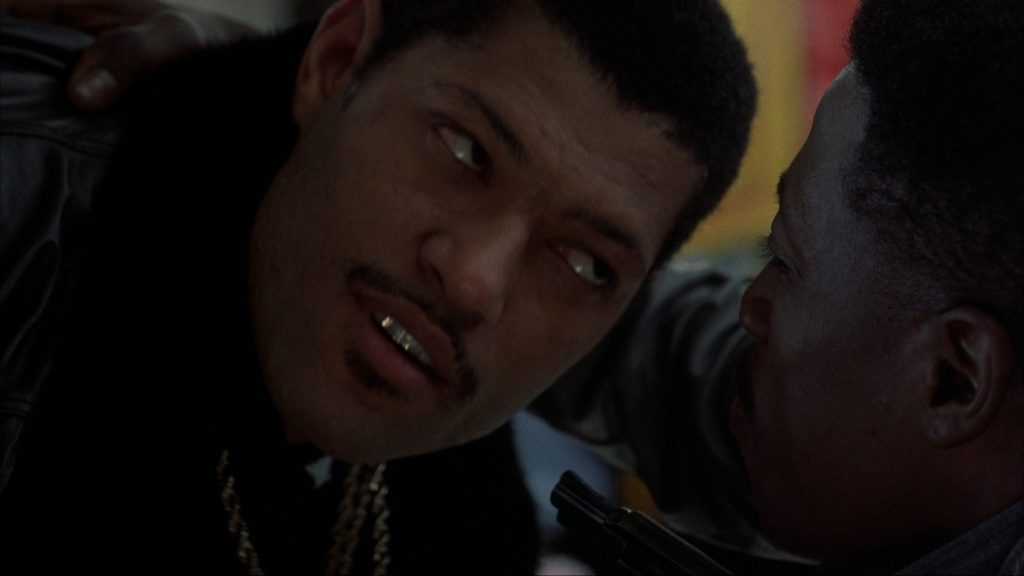
But, of course, from the subterranean streets where he and his crew roam to the skyscraper penthouses where he makes deals, there really is no distinction. Reagan’s appalling trickle-down-economics theory is taken to task by Ferrara—there’s no benefit to yield from the activities of these people besides the monetary gains they themselves enjoy. There’s a direct pipeline connecting the power and money of New York, and any person outside of it receives nothing. “I’m not your problem, I’m just the businessman”, Frank tells Bishop. It’s a grim statement designed to fuel hopelessness. It’s the vampire in Frank coming out again.
Frank is a man at war with himself; torn between cockily parading his remorselessness in front of anyone who’ll listen, and trying to make up for the damage he’s done. If he leaned further into the former, he might be like Jimmy Jump (Laurence Fishburne), Frank’s biggest hype man and the film’s largest character. He cackles and screams when wounded in a gunfight, he contemptuously hurls ten dollar bills at Flanigan and tells him to buy flowers for his witness; he owns the film whenever he’s on screen.
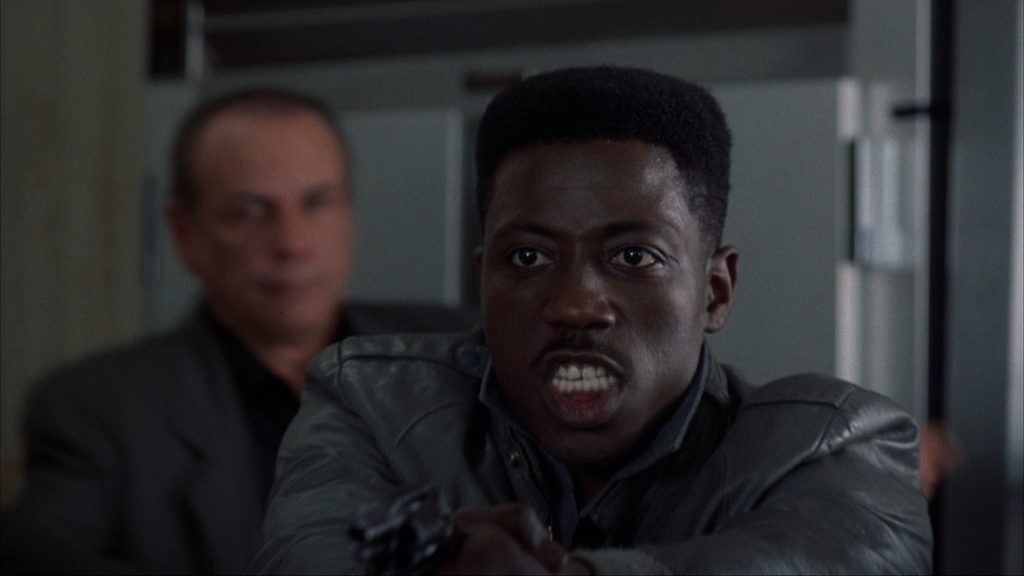
Fishburne takes a big swing with Jump and it’s absolutely riveting to watch him strut and sneer his way through chaos. And yet, there he is, giving a $20 bill to a grandmother in a fast-food joint and telling her to get her grandkids whatever they want. He and Frank share a strange kinship through their quasi-Robin Hood standing in the community, taking with one hand and giving with the other. It’s a möbius strip of necessity, crime, and absolution.
Ferrara’s directorial choices are frequently big swings, too. His set-pieces are filled with women in cocktail dresses firing Uzi’s, and almost comical amounts of blood bathed in orange and blue lights. One of the most exciting sequences takes place on cobblestoned streets in the pounding rain—in making violence look this alluring, Ferrara points towards the cheap, awful thrills that draw these men in. The film’s pulp aesthetics never undermine its points because we understand that, as much as a comment on capitalism as it is, King of New York is also a broad, tragedian tale of downfall and attempted redemption.
Ferrara pushes two colours forward throughout: orange and blue. And the contrast of these colours is no coincidence. On the streets, where the victims of Frank, of poverty, and of oppressive power lies dying in the gutter, everything is blue. Above the city, in seemingly untouchable apartments, there is a warm orange that suggests heavenly redemption. Frank probably wonders often whether he’s going there when he dies. But under any light, blood is red, no matter how it appears, and all money is covered in it. The daily grind continues.
ITALY • USA • UK | 1990 | 103 MINUTES | 1.85:1 | COLOUR | ENGLISH

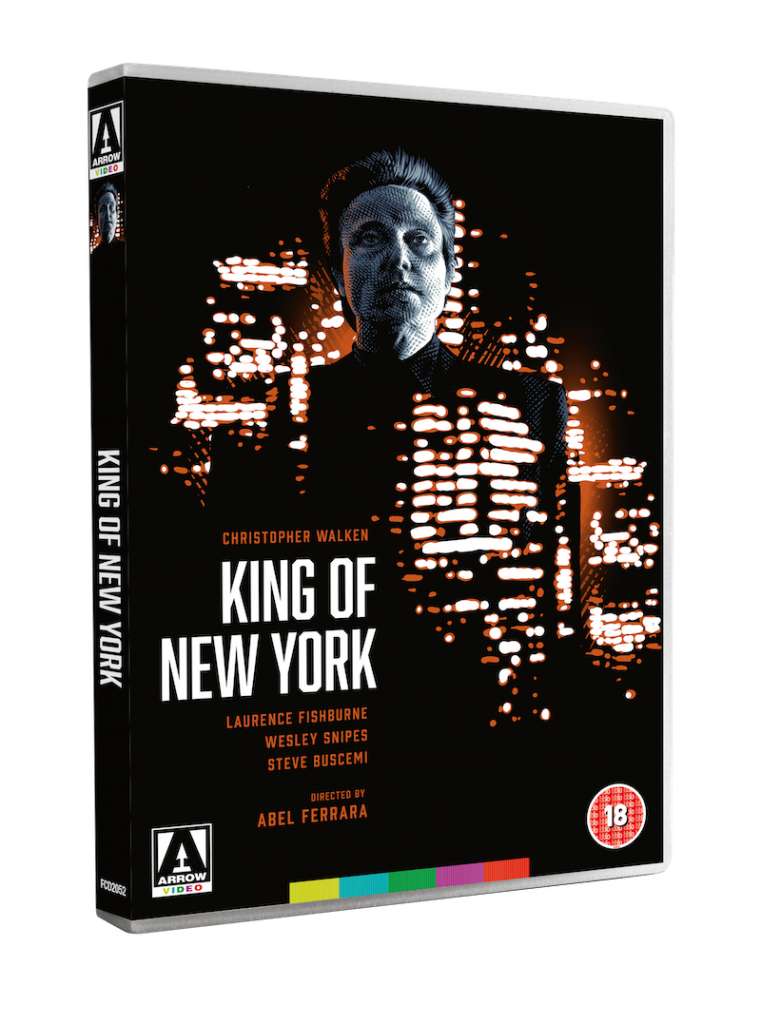
The restoration’s strongest suit is its HDR-enhanced colour palette. The blues and oranges look particularly striking. Some of the definition isn’t as crystal clear as it could be, but this is a 30 year old film, and looks better that it ever has. The film’s brooding score and sharp-sounding gunfights are presented very well on the disc, with rich DTS-HD Master Audio 5.1.
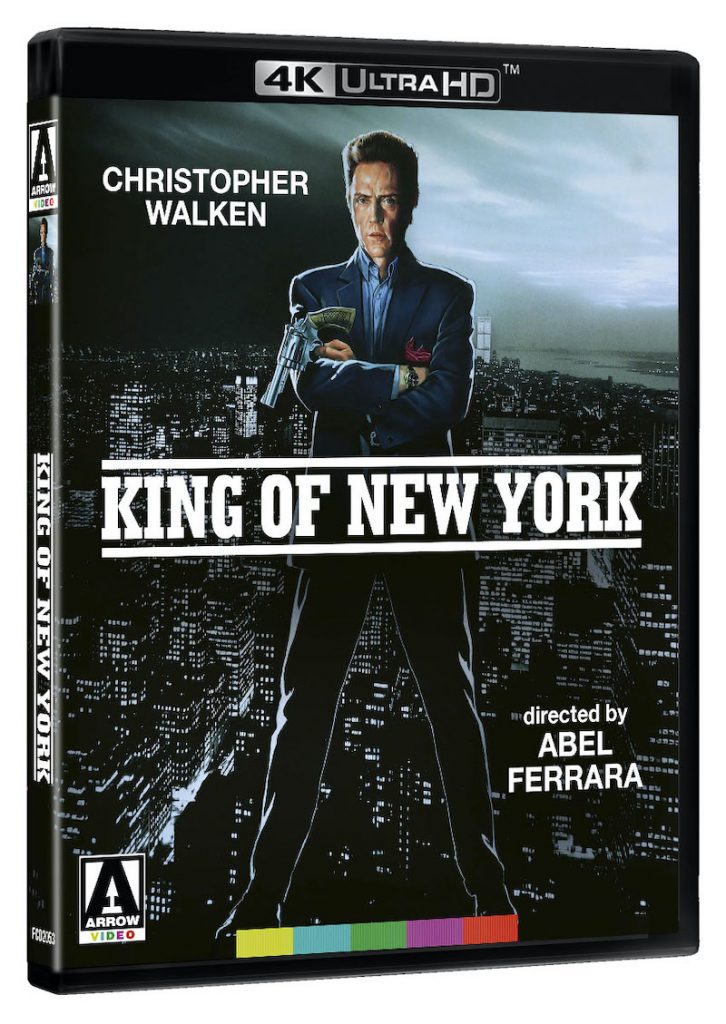

director: Abel Ferrara.
writer: Nicholas St. John.
starring: Christopher Walken, David Caruso, Laurence Fishburne, Victor Argo, Wesley Snipes, Janet Julian, Joey Chin, Giancarlo Esposito & Paul Calderon.
